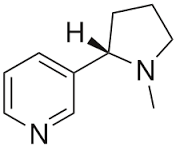记忆方法
1. 音译“尼古丁”。
中文词源
nicotine 尼古丁
来自拉丁语Nicotiana,烟草植物的拉丁名,来自16世纪法国驻葡萄牙大使Jean Nicot,即Nicolas,因他从葡萄牙带回烟草种子到巴黎而得名。
英语词源
- nicotine
-
nicotine: [19] Nicotine gets its name ultimately from Jean Nicot, 16th-century French ambassador in Lisbon, who in 1560 got hold of some samples of the new ‘tobacco’ and sent them to the French queen Catherine de Medici. The tobacco-plant was named herba nicotiana ‘herb of Nicot’ in his honour (whence the modern English term nicotiana for all plants of this genus), and nicotine was derived from nicotiana, originally in French, for the addictive alkaloid obtained from it.
- nicotine (n.)
- poisonous alkaloid found in tobacco leaves, 1819, from French nicotine, earlier nicotiane, from Modern Latin Nicotiana, formal botanical name for the tobacco plant, named for Jean Nicot (c. 1530-1600), French ambassador to Portugal, who sent tobacco seeds and powdered leaves back to France 1561. His name is a diminutive of Nicolas.
权威例句
- 1. After about three months, I was no longer addicted to nicotine.
- 大约3个月后,我就不再对尼古丁上瘾了。
- 2. It allows nicotine to diffuse slowly and steadily into the bloodstream.
- 它能使尼古丁平稳缓慢地渗透到血液里。
- 3. Nicotine marks stained his chin and fingers.
- 尼古丁渍染黄了他的下巴和手指。
- 4. Nicotine is a psychoactive drug.
- 尼古丁是一种影响精神活动的毒物。
- 5. Many smokers who are chemically addicted to nicotine cannot cut down easily.
- 许多有尼古丁瘾的抽烟人不容易把烟戒掉.
